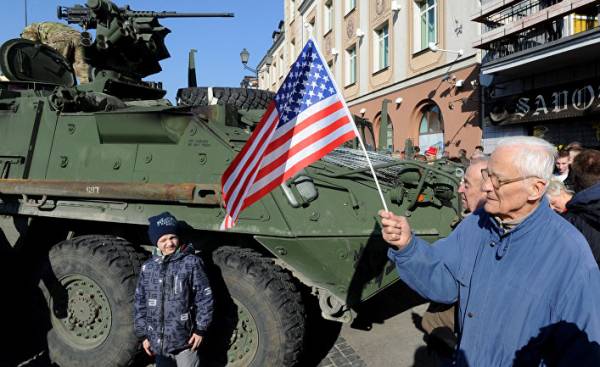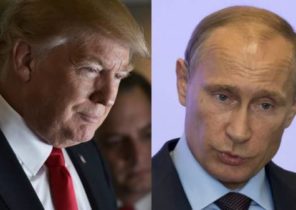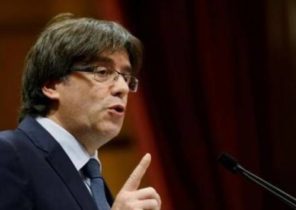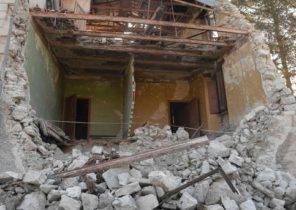
The message that Donald trump Jr. met with a Russian lawyer, who promised to provide compromising information about Hillary Clinton, confirms the need to provide a comprehensive assessment of the harm that may have been done to our democracy in the elections of 2016. Conducted by the special Prosecutor Robert Mueller (Robert Mueller) the investigation in connection with allegations of Russian interference in elections, its collusion with the electoral headquarters of the trump and the possible criminal actions of the President of trump or his assistants is crucial. And you need to provide him the opportunity to draw their own conclusions without the intervention of the White house. In addition to the protection of the ongoing investigations the Democrats should create an independent Commission to develop a plan of action is necessary in order to prevent violations in future elections and falsification of their results.
All this must be done clearly, in the actions must not be contradictions, and they should not be controversial. Along with this there is another series of facts that in this difficult time must be taken into account. We are talking about with regard to the failure of U.S. policy toward Russia and the dangerous path on which to present our country. It’s also about the real and present threats that cannot be ignored. Indeed, the crisis we now face, shows clearly that it is time to fundamentally rethink our approach to relations with Russia.
In connection with the deterioration of U.S.-Russian relationship risk of nuclear disaster — including the danger posed by the nuclear weapons of North Korea — rose to its highest level since the end of the cold war. According to “Bulletin of the atomic scientists” (Bulletin of the Atomic Scientists), the danger of nuclear war is now higher than in 1949 when the USSR tested its first nuclear device. The new cold war from time to time makes itself felt in the form of dangerous military incidents in three towns. In Syria, in the skies over the Baltic sea, on the Western border of Russia (where in high alert given the NATO troops numbering 300 thousand people and where Russia and NATO are deploying more forces and resources and stepping up military exercises), as well as in Ukraine. The United States and Russia together hold almost 14 thousands of nuclear weapons that is more than 90% of the world’s nuclear Arsenal. Moreover, almost two thousand of these units are in a state of high alert. So this extreme danger of a nuclear war can be reduced only through cooperation between our two countries.
Along with this came the era of cyber warfare, which are conducted without any agreed rules and which determine the nature of traditional war or, for that matter, nuclear deterrence. The growing threat of hacker attacks, not only on e-mail servers and e-voting systems, but also on power, strategic warning systems and operational control centers. For many years there has been discussion about the need to create clear rules of the game for cyber warfare. Now amid reports of an escalation of intervention there is an urgent need control of cyber weapons (along with conventional, chemical and nuclear weapons) by the conclusion of the contract, which is binding and which is verifiable. However, as in the previous case, this can happen only if the existence of a more constructive U.S.-Russian relations.
Given these serious threats to the escalation of tension in relations with Russia meets neither national interests nor helps to ensure our national security. The extension of sanctions will only drive a wedge between the United States and the EU, would force Russia to retaliate and make it more difficult to achieve agreements. What was needed was not moralizing and triumphalism, and diplomacy and dialogue.
Needless to say, once again to achieve a real detente in relations with Russia will not be easy. This requires experience, talent and perseverance. Russian President Vladimir Putin heads an authoritarian regime violating the fundamental rights. Russia’s annexation of Crimea in 2014 is a violation of international law. And the deployment of US forces and NATO on Russia’s borders, Putin said strengthening the armed forces of his country, including the growing number of missiles capable of carrying nuclear warhead, thereby increasing the risk of accident, miscalculation and escalation. As for President trump, he has demonstrated that he has neither the appropriate character nor advisers to maintain a consistent political initiative. It is difficult to understand how we can achieve a discharge, but we came to the negotiations with those governments which we have, and not those which we would like to have. Choice is simply no.
Democrats, whose understandable desire to oppose the Trump contributes to “anti-Russian obsession” should be considered a different reality. If they pay all their attention only trump’s relations with Russia, they can’t win on the critical midterm elections in 2018 and to achieve tangible victories in the solution of such problems as health, climate change and inequality that affect our lives. Moreover, the cold war, kill progress: they contribute to the strengthening of the “war party”, inflate defense budgets, and depletes funds that could more usefully go to the rehabilitation of infrastructure and expansion of social programs. They empower and mobilize the worst political forces and exclude the possibility for dissent. It equally applies to the United States, and Russia. For 152 years of its existence, the magazine The Nation has witnessed as a war fever is being used to trample rights here in the US. And, after working with Russian dissidents, journalists and representatives of feminist NGOs thirty years, I have personally seen how the cold war can be used in this country to suppress independent opinion.
The essence lies in the fact that the opposition Trump should not turn into something akin to a contradiction to common sense. Common sense tells us that we may defend our own democracy, strengthening our electoral system to resist external intervention. Common sense tells us about the need for an independent investigation into the allegations of Russian interference in the presidential campaign. But he also tells us that we can’t solve many of our most urgent challenges — from Syria to climate change, nuclear proliferation and cyber warfare — if the US and Russia will not find it possible to interact when it serves our common interests. To cooperate with the Russian authorities in the sphere of vital interests, we don’t have to agree with them and accept them with open arms. But we can’t prevent the revival of the sentiments and passions of the cold war, which could discredit those who seek to de-escalate the tension. Attempts to curtail debate can compromise the security of our country.
I’m the editor of the magazine The Nation, having a long tradition to accept and support alternative viewpoints and unpopular opinions, especially in matters of war and peace. And I think that it is important to take a critical analysis of conventional wisdom, encouragement, and not to limit discussion and to counteract the forces that vilify those who favor improved relations and seek to do so. And again, despite the fact that the persistent assertion that the U.S. and Russia are seriously interested in maintaining business relations, probably, not popular, it is not yet radical opinion. It’s just sober realism.






